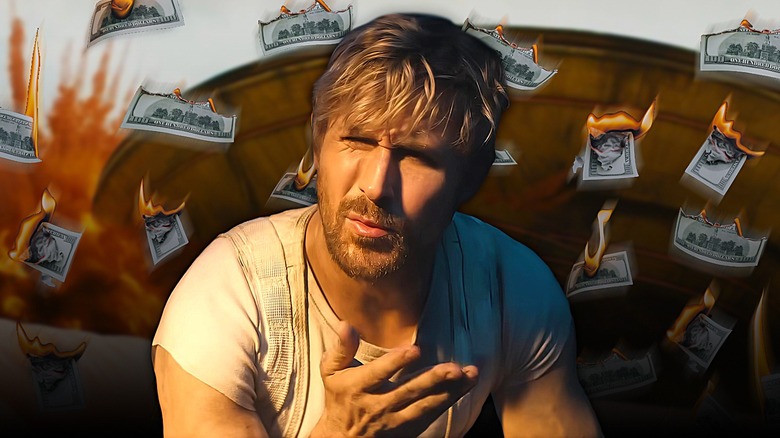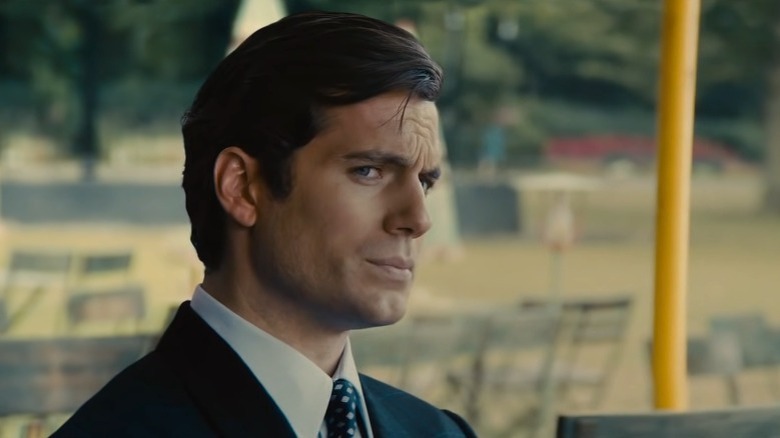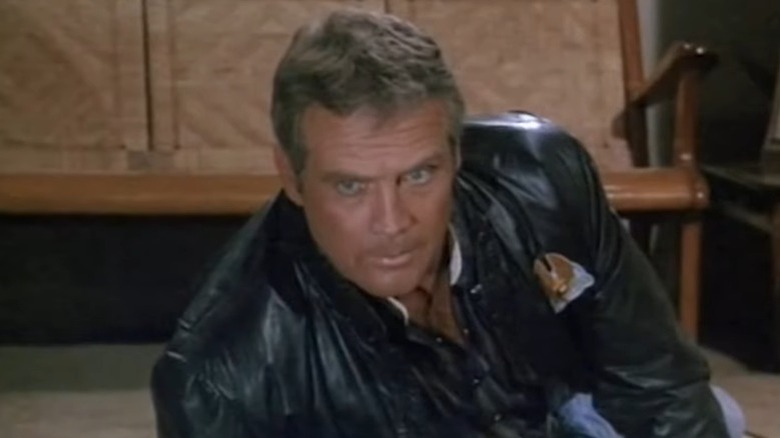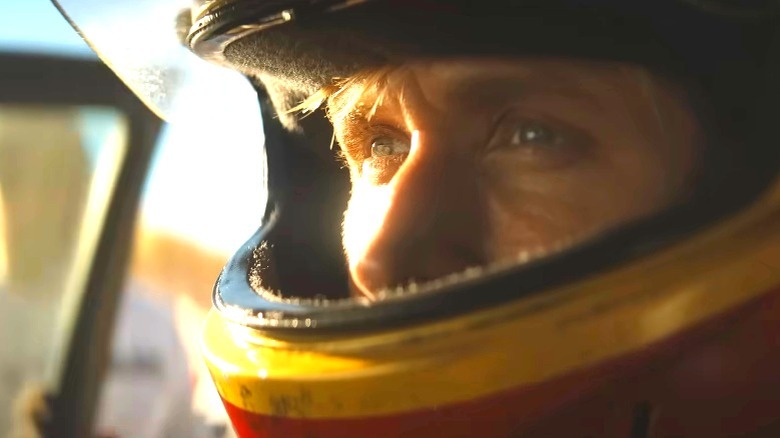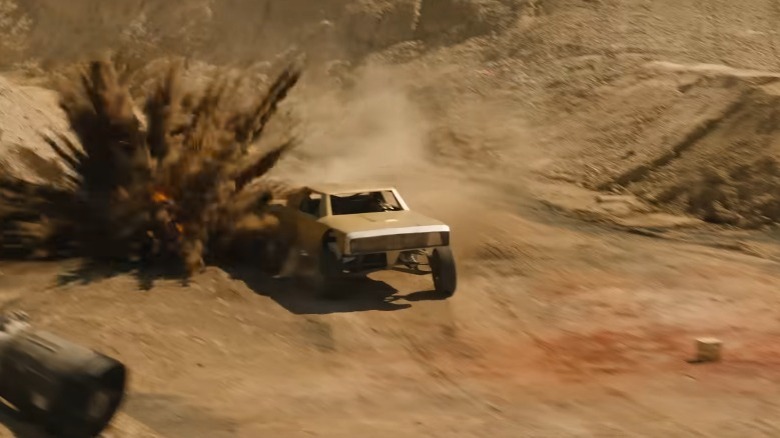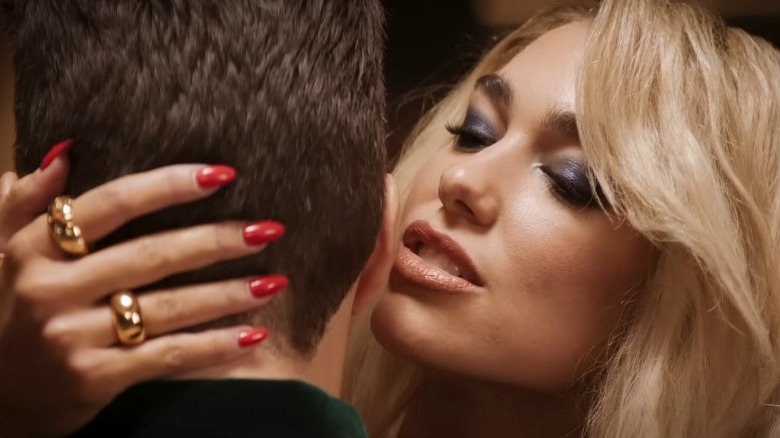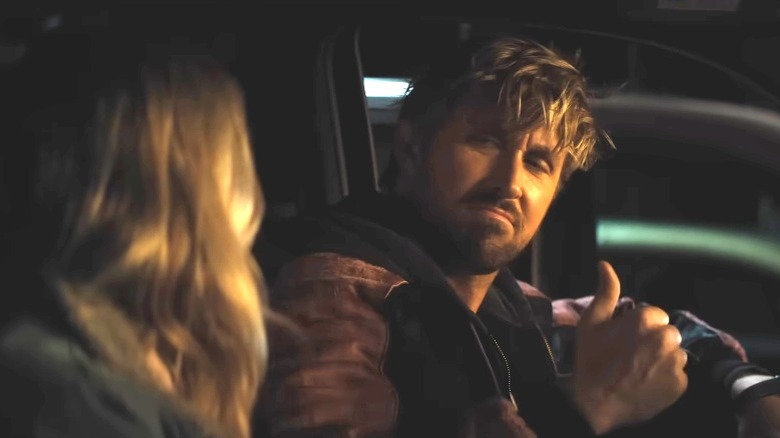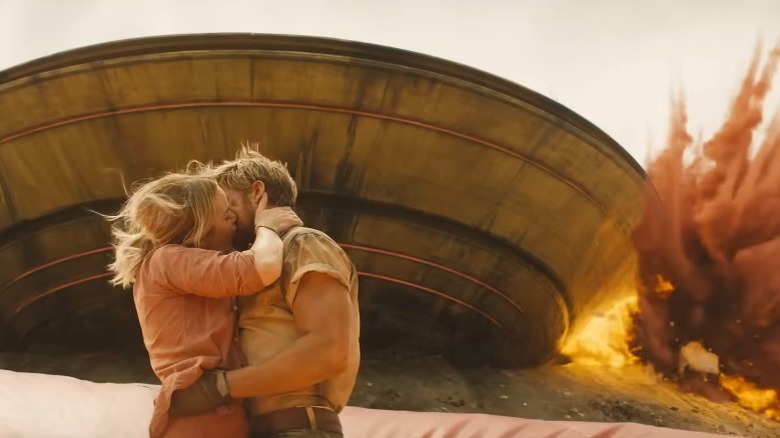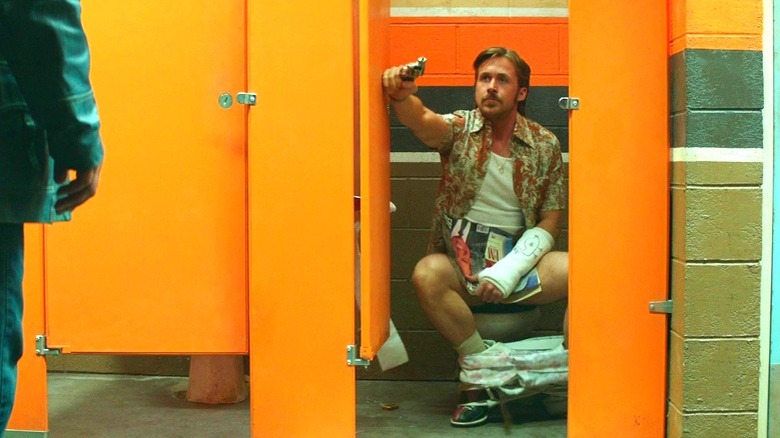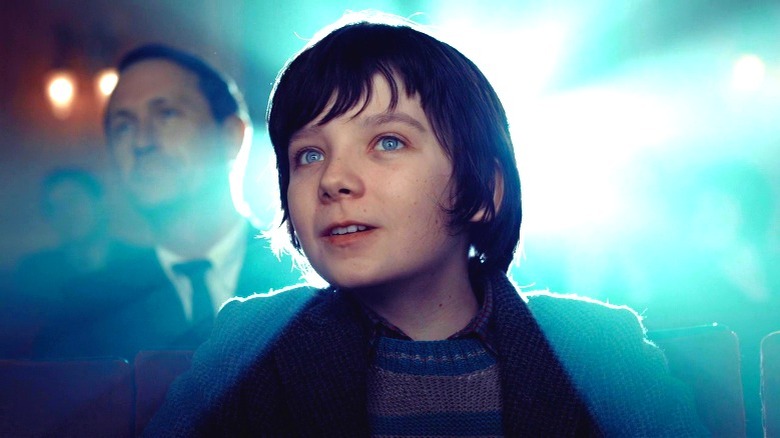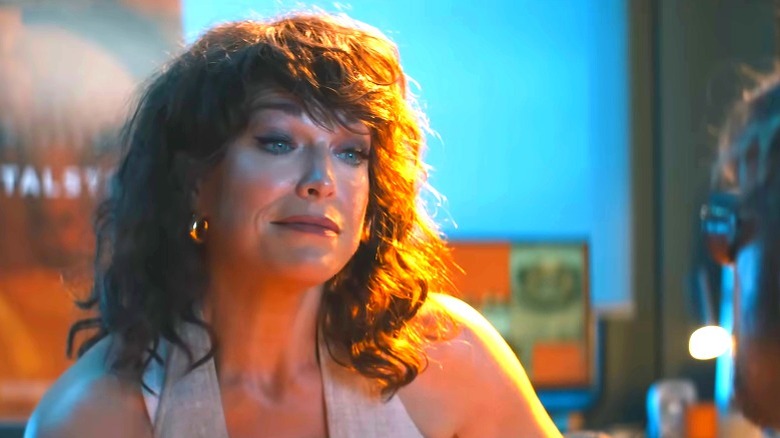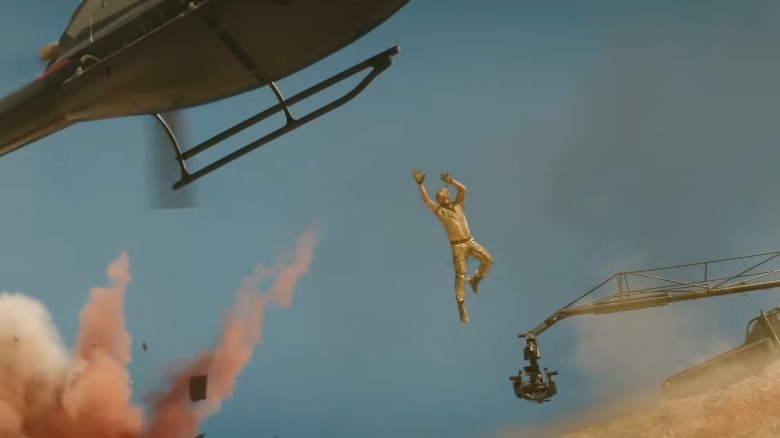Why The Fall Guy Bombed At The Box Office
Summer blockbuster season brings with it all the usual industry trepidation around which of the major studios' big money-making bets will actually manage to make bank. Proceedings in 2024 were "officially" kicked off by David Leitch's "The Fall Guy," a rip-roaring action comedy based on the eponymous '80s series originally broadcast on ABC — and, as far as financial performance goes, it was not a particularly auspicious start to the season.
Although "The Fall Guy" received positive reviews (Looper's review called it a crowd-pleasing love letter to stuntmen), it scored a disastrous opening weekend gross of $27.7 million, which was followed by an even more disastrous drop of over 50% in its second weekend. The reason "disastrous" applies here, of course, is that the film's budget has been reported to be as high as $150 million; when marketing costs are added, its total price tag adds up to at least $200 million. In light of that hefty investment, "The Fall Guy" can already be safely declared a box office flop two weeks into its run.
That underwhelming performance has zero bearing on the film's quality, of course, but it's dispiriting news nonetheless for a still-wobbly movie industry. What could possibly explain the fact that a fun, solid summer romp starring Ryan Gosling and Emily Blunt is almost certainly not even going to break even in theaters? Well, as it happens, there may be quite a few reasons why.
TV show adaptations haven't been good box office bets lately
On paper, the logic behind adapting a popular television series into a major motion picture appears sound. Because long-running series can have an immense cultural impact, it would seem reasonable to imagine that a film adaptation will have a large built-in audience, while also retaining enough structural and narrative independence to potentially bring in a whole new host of viewers. This wisdom has, indeed, proved applicable in the case of such worldwide hits as "The Simpsons Movie," "The Fugitive," "21 Jump Street," and the "Star Trek" and "Mission: Impossible" film franchises. But looking at the big picture, TV show adaptations seldom make for sound financial bets — especially in recent years.
Aside from "21 Jump Street" — which arguably departs too much from the original '80s series to really count as a de-facto adaptation — the last 15 years have been peppered with failed small-to-big screen ventures. "The A-Team," "The Lone Ranger," "Land of the Lost," "The Man From U.N.C.L.E.," "Mr. Peabody and Sherman," "Entourage," "State of Play," and the 2019 "Charlie's Angels" are just a few examples of movies that were unable to port over the popularity of the shows they were faithfully or loosely based on. Sometimes, the connection to a lengthy, landlocked TV property does more harm than good, limiting a movie's potential audience only to the finite group of people who have put a huge time investment into watching the show.
The Fall Guy may have fallen through the cracks of nostalgia
Part of the issue, of course, is which show is being adapted. "The Fall Guy," the original ABC series that ran from 1981 to 1986 and aired 113 total episodes, was very popular in its day, consistently ranking among the top American shows in Nielsen rankings. But there's a very big gap between good ratings 40 years ago and contemporary audience appeal.
Successful as it may have been at the time, "The Fall Guy" is just not the kind of huge property that can immediately spark interest with its name alone; the show didn't have much cultural staying power beyond the generation that actually grew up with it. People born from the '90s onward are not necessarily aware of it at all — which is a problem when the film adaptation is so clearly angling to win over Gen Z and millennial viewers.
The folks who do remember "The Fall Guy" and did have a connection to it, meanwhile, might have already outgrown it; although it featured legendarily exciting stunts and car chases, it was still a light, PG-rated adventure-of-the-week actioner, without much of the dramatic weight or memorable mythology that might keep fans nostalgic for it well into their 40s. All in all, as an intellectual property, "The Fall Guy" might have fallen through the cracks, appealing to no generation in particular.
The trailers weren't very good
The two main trailers for "The Fall Guy," which seemed to screen incessantly before virtually every big-budget movie for months, had major issues on every front. The editing on both of them was shoddy and arrhythmic, taking way too long to establish the characters and the premise, failing to build to an exciting crescendo, and drastically overstaying their welcome — the first trailer clocked in at an unforgivable three minutes and 22 seconds, and the second one wasn't much zippier at three minutes.
On top of that, the jokes chosen for the trailers were not especially funny (some didn't even make it to the final film), and the music use — including the hook of "You Give Love a Bad Name" played on an endless loop at seemingly random points — was actively grating.
The real sin of the promotional campaign for "The Fall Guy," though, was that it just reeked of trying too hard. This was apparent enough in the two regular trailers, but came through most clearly and insufferably in the "Everything" teaser and the various ads. Those threw randomness and social media parlance around and emphasized a Taylor Swift song making Ryan Gosling cry, in a seemingly desperate bid to make memes out of the movie — before the movie was even a thing.
The practical stunts weren't sold very well
Movie marketing focused primarily on would-be memes and meta-humor for its own sake rarely works. Positioning your film in a tongue-in-cheek manner as an absurd caricature of overstuffed Hollywood silliness doesn't make it look fun and irreverent; it makes it look like overstuffed Hollywood silliness. In this case, it made a genuinely funny and charming comedy look like it would also rely on that brand of cringeworthy Gen Z-pleading "random" humor, as opposed to, y'know, actual jokes. But it was also an entirely wrong decision for this particular movie because "The Fall Guy" had an actual, major selling point that got practically (no pun intended) drowned out: the stunts.
Much like the original series, "The Fall Guy" is built around elaborate, dashing, high-octane practical stunts, buoyed by the expertise that Leitch honed in "John Wick," "Atomic Blonde," "Deadpool 2," and "Bullet Train." If you didn't know the director of "The Fall Guy" had also directed or co-directed all those films and overseen their thrilling action sequences, including "Bullet Train" fight scenes that were more real than many realized, it's not your fault — the marketing team of "The Fall Guy" didn't seem to know, either. If you also didn't know that this movie features some of the most massive and mind-blowing practical stunts and effects of any Hollywood blockbuster in years, it's equally unsurprising, seeing as neither the trailers nor the ads seemed too concerned with promoting that fact.
The market for goofy action comedies is getting oversaturated
Speaking of humor-focused ads, like so many Hollywood movies released from 2016 onward, the marketing of "The Fall Guy" made it seem like it was trying to be the new "Deadpool." From the forceful attempted meme-making to the constant self-deprecation to the gleefully violent machismo to the absence of any emotional or conceptual center, the message being sent to the public clearly was, "It's got jokes and punches! You like that, right?"
To be clear, the movie itself isn't like that at all. But the marketing team's effort to court the same audience that made "Deadpool" a history-making box office hit speaks to a broader industry issue, which is the fact that too many darn movies are trying to be the new "Deadpool" — yet none so far have even come close to pulling it off.
Since 2016, we've had "The Gentlemen," "Tag," "Logan Lucky," "The Unbearable Weight of Massive Talent," "Men In Black: International," "The Hitman's Bodyguard," "Bullet Train," "Argylle," "Violent Night," "6 Underground," "Red Notice," and "Ghosted," just to name a few. Some moderate hits, many flops and underperformers, a few straight-to-streaming also-rans — and not a single "Deadpool"-level phenomenon. The assumption that action plus jokes equals profit hasn't always been borne out by the post-"Deadpool" reality, and there's a non-negligible possibility that whatever market there was for this particular blend of genres has simply gotten too crowded.
Critical reception wasn't ecstatic enough
It's sometimes the case that, when a movie gets off to a rough start commercially or has some roadblocks to face in terms of mainstream appeal, critical reception ultimately buoys it along to a solid run. The rapturous critical reception to "Mad Max: Fury Road" was arguably the primary factor in helping the movie overcome a subpar opening weekend and keep bringing in crowds for much longer than anticipated, and it's unlikely that "Dune" would have reversed the disastrous box office history of the 1984 version and climbed to $400 million in the post-pandemic climate if it hadn't been widely touted by critics as a must-see event.
As for "The Fall Guy," it was generally well-received by critics — but did not garner the level of acclaim that makes prospective ticket buyers stop and pay attention. Its score of 73 on Metacritic puts "The Fall Guy" in the 15th percentile of all action films released in the past decade, but doesn't really speak to breathless enthusiasm. On Rotten Tomatoes, the review aggregator that most people actually check, it scored 82% with an average grade of 7.1 — an even less impressive result by Rotten Tomatoes standards. Perusing individual reviews from major publications, meanwhile, turns up faint praise like The New York Times' "divertingly slick, playful nonsense," IndieWire's "very self-aware, which mostly works," and IGN's "funny and sincere enough to make for a good time." Hardly enough to get butts in seats.
What was even the target audience for this movie?
What's especially bizarre about the franchise history of "The Fall Guy" is that it was scarcely brought up at all in the promotional material. Neither the trailers nor most of the ads directly mentioned the original ABC show; it wouldn't be out of line to assume that most of the moviegoing public under 40 wasn't even aware that "The Fall Guy" is based on an existing IP.
This wasn't just an isolated weird choice — it was a reflection of the movie's general indecision when it came to selling itself and staking its claim to the summer blockbuster audience. "The Fall Guy" looks like an original movie without really being one, yet it isn't exactly a synergic brand revival, either; the plot and characters bear only a passing resemblance to anything in the series.
It's kind of a play for Gen Z affection, with the snarky tone and attempts at meme-making, but it's also kind of a bid for Gen X nostalgia, with a Bon Jovi-scored trailer that subtly rewarded fans of the 1981 TV show, plus original stars Lee Majors and Heather Thomas in post-credits scene cameos. It's a straightforward Hollywood action flick for those who love the genre, but also a spoof of Hollywood action flicks for those who look down on it. It's a thrilling blockbuster adventure, but also a romantic comedy. No target demographic was clearly established — and indeed, none materialized.
Ryan Gosling doesn't necessarily mean big box office
The massive success of "Barbie" and the social media earthquake that was Ryan Gosling's performance as Ken have contributed to a general cultural impression that the 43-year-old Canadian actor is a movie star who's on top of the world. Even before "Barbie," Gosling had been a household name for years, recognizably mainstream enough to get name-checked in a Meghan Trainor song. And he's had his share of bona fide hits, including most notably "La La Land," "Crazy, Stupid, Love," and, of course, "The Notebook."
But take another look at that list of career hits. What do all those movies have in common? The answer: they're all romances first and foremost (with the added bonus of musical numbers, in the case of "La La Land"). Ryan Gosling is a pretty dependable romantic lead, but he hasn't been a major audience draw outside of that genre; in fact, there are a good handful of forgotten Ryan Gosling failures out there.
Leaving aside "The Gray Man" and its arcane Netflix metrics, his most recent mainstream non-romantic starring vehicles prior to "Barbie" — "First Man," "Blade Runner 2049," and "The Nice Guys" — all underperformed. In fact, his only real box office hit in the action genre has been "Drive," all the way back in 2011. You'd think that history would have inspired "The Fall Guy" marketing team to do the sensible thing and play up the romance with Emily Blunt, but alas.
Movies about the film industry are rarely hits
People want to see movies, and they want the movies they see to be well-made, but mainstream audiences have rarely taken to movies about the process of making movies. Granted, the highest-grossing film of all time about the movie business was also a Ryan Gosling vehicle — namely, "La La Land" — but that was pretty much an isolated sensation. Barring other individual phenomenons like "Tropic Thunder" and Best Picture winners like "The Artist," "Birdman," and "Argo," the last few decades haven't been kind to movies about the film industry.
"Hugo," for all its acclaim and its five Oscar wins, grossed $180 million worldwide against a budget of $180 million, making it a tremendous bomb. "Trumbo" didn't manage to translate Bryan Cranston's popularity into ticket sales, Robert Rodriguez and Quentin Tarantino's "Grindhouse" was a massive flop, and "Looney Tunes: Back in Action" is the only "Looney Tunes" theatrical film that didn't even manage to make back its budget. The commercial thorniness of that thematic bracket goes all the way back to '90s commercial failures like "The Muse" and "Ed Wood."
In fact, even the original "The Fall Guy" series was less industry-centric; Colt Seavers' (Lee Majors) Hollywood experience was mostly used as a backdrop for his exploits as a bounty hunter. Conversely, David Leitch's "The Fall Guy" is all about the set run by Jody Moreno (Emily Blunt), with a plot driven by the effort to save Jody's movie from ruin.
The budget was simply too big
At press time, "The Fall Guy" has already grossed around $50 million domestically and over $100 million worldwide, which isn't money to scoff at. It wouldn't be considered a flop, and none of the aforementioned issues would be issues at all, if not for the fact that the budget was so big.
$150 million plus marketing costs has become a standard amount of money to spend on a blockbuster in an established franchise; "Kingdom of the Planet of the Apes," the movie that dethroned "The Fall Guy" from the #1 spot at the U.S. box office, was budgeted at a similar level. But it is utterly unreasonable to put that kind of money into a film without a high guaranteed baseline of return on investment. If action comedies, TV-to-film adaptations, big-budget Ryan Gosling vehicles, and movies about the film industry have all struggled financially in the past, it's unthinkable for a movie combining all those risk factors to be as astronomically expensive as "The Fall Guy."
Had the film been budgeted at a safer $70-80 million, it would still be struggling to break even, and in need of very good legs to become a proper financial success. But starting with a production and marketing cost of at least $200 million to recoup, "The Fall Guy" probably never stood a chance. Unless you're George Miller making "Mad Max: Fury Road" in the Namib, it's best to leave budgets that high to the absolute safe bets.
Blockbuster fatigue may be more serious than Hollywood thought
"The Fall Guy" is far from the only recent blockbuster to come with a ridiculously high price tag. Hollywood has seen a seemingly unending string of high-profile underperformers extending from 2023 to now, "Barbie" and "Oppenheimer" notwithstanding.
"Mission: Impossible — Dead Reckoning Part One," "Ant-Man and the Wasp: Quantumania," "Indiana Jones and the Dial of Destiny," "Aquaman and the Lost Kingdom," "Transformers: Rise of the Beasts," "The Flash," and "The Marvels" all cost anywhere from $195-$300 million or more before marketing costs, and all grossed significantly below expectations. Even moderate successes like "Fast X" and "The Little Mermaid" haven't been hitting like their brand predecessors. The pre-pandemic world of four to nine billion-dollar hits per year may well be behind us, and "The Fall Guy" is just the latest example of Hollywood's seeming refusal to adjust budgets to conform to this new reality.
All in all, it may well be time for the industry to completely rethink the blockbuster pipeline. It's clear that, with the post-2020 drop in theatrical attendance, there's only room for so many "event movies" each year, and the mission of bringing audiences to theaters can't be wholly structured around them — nor can budgets in the hundreds of millions keep being granted left and right. There's certainly a big audience out there for funny, goofy, meta, romantic, action-packed films like "The Fall Guy," but Hollywood needs to recover the ability to assess its size, and properly target it.
